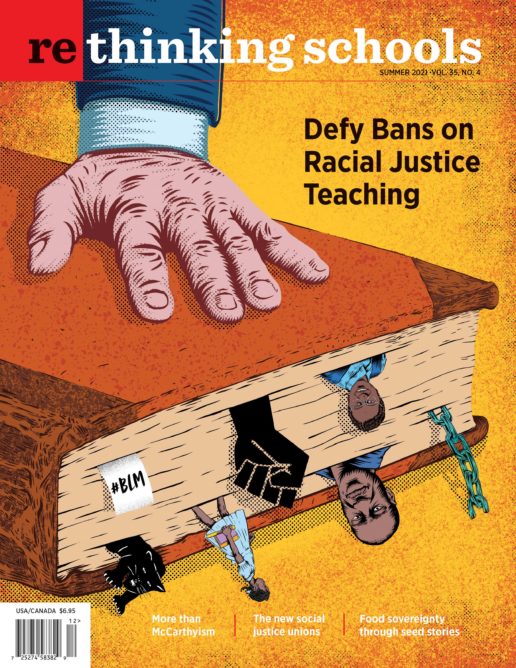“I’m Going to Keep Doing What I Do”
Iowa Educators Resist New State Law
In May, Jesse Hagopian, Rethinking Schools editor and high school ethnic studies teacher, interviewed Black Lives Matter at School-Iowa educators Monique Cottman and Lisa Covington.
Cottman (blmatschoolsiowa@gmail.com) is a 6th-grade teacher in Iowa City. She is an NEA member who works with teachers across the state on social justice and cultural competency.
Covington (profcov1@gmail.com) works with youth and is a doctoral candidate in sociology of education at the University of Iowa. She teaches a community ethnic studies class in collaboration with Sankofa Outreach Connection.
Jesse Hagopian: I understand that Iowa is one of a number of states to pass a bill banning the teaching of structural racism, with similar bills having been introduced into state legislatures in more than 20 states. Tell us about the Iowa bill.

Monique Cottman: In 2016, Iowa Democrats lost their three-seat senate majority. When those senators were there, every time all these conservative bills would come up, they would never get past the senate. The anti-trans, pro-racist stuff that we’re seeing this year, people in Iowa are used to seeing those bills come up every single year. It’s just that people didn’t have to worry about them getting traction when the Democrats ran the senate. Now, the Republicans have the house, the senate, and the governor’s office. Everything just keeps coming back again and again and again — anti-labor, anti-love, anti-education, anti-Black.
With Trump, the national political landscape completely shifted to where the legislature felt “Yeah, this is the time to get everything pushed through.” So as soon as this legislative session started, we saw bills coming out saying we’re going to require the Pledge of Allegiance, we’re going to ban trans people from sports, we’re going to ban the 1619 Project, and we’re not going to do any diversity training. I’ve been in Iowa since 2006, and six years ago I would have said there’s no way in hell that any of that would pass. But all of that stuff skated through virtually unchallenged this year.
House File 802 says that public schools can’t do diversity training or teach real U.S. history. And what’s messed up about their argument is they claim to support anti-discrimination. They are saying because you can’t discriminate against anyone for their race, you cannot teach about white supremacy culture — because that makes white people feel bad. They say, “Teach about racial discrimination, but not about structural racism.” But it doesn’t make any sense. The bill really protects white fragility by trying to hide from students the fact that there is white privilege. Yet the bill itself is a clear example of how white supremacy culture presents itself in our schools.
Lisa Covington: That’s right. The bill bans teaching that “the United States of America and the state of Iowa are fundamentally or systemically racist or sexist.”
Jesse Hagopian: That is really outrageous. Given that according to Merriam-Webster “fundamental” means “serving as an original or generating source.” How can we teach the fact that our country originated by taking land and lives of Native Americans and with the enslavement of African people? You literally can’t teach about the founding of this country or its long history without talking about systemic racism.
Monique Cottman: Well, Senator Ernst said in a 2020 interview that there is no systemic racism in Iowa. People should know that an earlier house file would have banned the 1619 Project explicitly, but that bill didn’t end up passing.
Lisa Covington: That would have been especially wrong to ban the 1619 Project given that the lead author of it, Nikole Hannah-Jones, is from Iowa. But the bill they did pass is about trying to stop educators from using resources like the 1619 Project or BLM at School — even if it doesn’t name them specifically.
Jesse Hagopian: What impact do you think this is going to have on teaching in public schools? What are you teachers in the movement prepared to do? How do you think this will play out?
Monique Cottman: It’s already playing out. White teachers who started doing a little bit more teaching about race and racism are now going back to their old way of teaching. I’ve had conversations with teachers who said things like “I’m getting so much pushback for teaching Alice Walker, I’m going to go back to teaching what I used to teach.” So teachers who would have done a little bit of what I was doing — anti-racism work and culturally responsive teaching — they’re not going to do anything next year. They’re already declaring “It’s not safe” or “I don’t want to lose my job.”
These are the kinds of decisions that teachers are making because they know they’re not going to get any support from their administrator or the school board when white parents start reporting teachers who teach real Black history. And nobody wants to deal with that. And that’s exactly what the government intended with the passing of this new law. It was about shutting down any momentum that we had from the mass Black Lives Matter marches and protests and things that were going on last year. They want to try to stop us from continuing to build up a base of allies who follow and listen to what we’re saying.
But let me be clear: I’m going to keep doing what I do, because that’s what I do. I’m going to teach the truth. As Assata Shakur said, “I have nothing to lose but my chains.”
Jesse Hagopian: And know that when you teach the truth, we’ve got your back and there will be a lot of folks around the country who rise up in support of you. I’m excited for the national day of action on June 12, in opposition to these bills banning the teaching of structural racism.
Lisa Covington: Yes. And this work is so important right now. This year we are getting students and teachers from all over Iowa to come together in community with each other to do this anti-racist work, and to ask them how would you like to contribute? How can we support you? We may be in Iowa City, and you may be in Des Moines or in Waterloo, but that doesn’t mean that we shouldn’t be connected. I had a meeting on Monday with the Des Moines BLM folks, and we’re working on supporting their Juneteenth event. We also are working on an event for the June 12th national day of action to teach the truth about structural racism. We will be focusing on honoring the legacy of Black folks in Iowa like Alexander Clark, who desegregated schools in Muscatine in 1868 and was the first Black person to graduate from the University of Iowa College of Law in 1879; Harriette Curley, who was the first Black teacher in the state during the 1940s; and countless other Black people who contributed to make the state a place where Black people can thrive. The June 12 Pledge to #TeachTruth Day of Action is a necessary reminder of this information. This kind of resistance is what’s going to bring us together in a struggle to allow teachers not to lie to their students.

